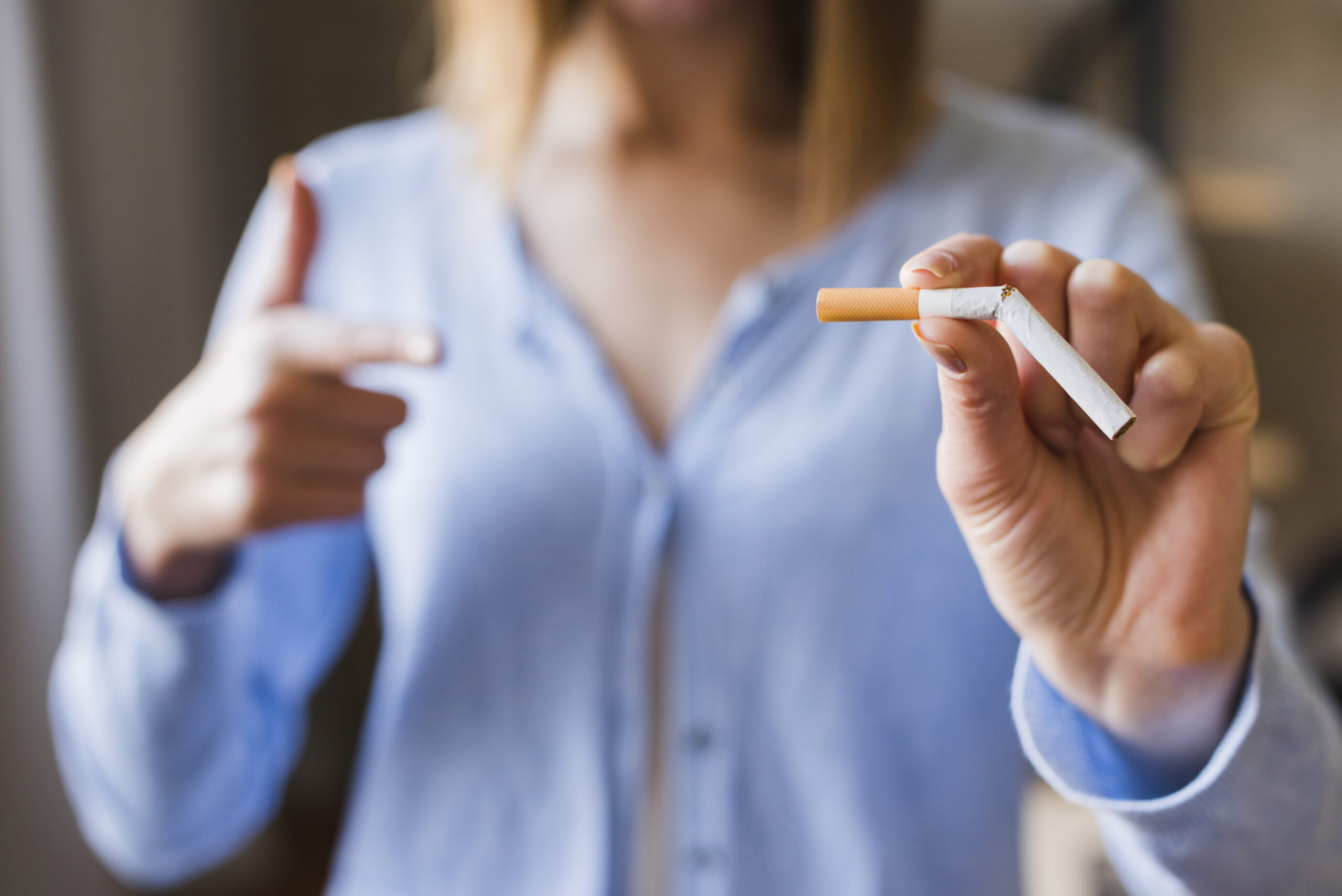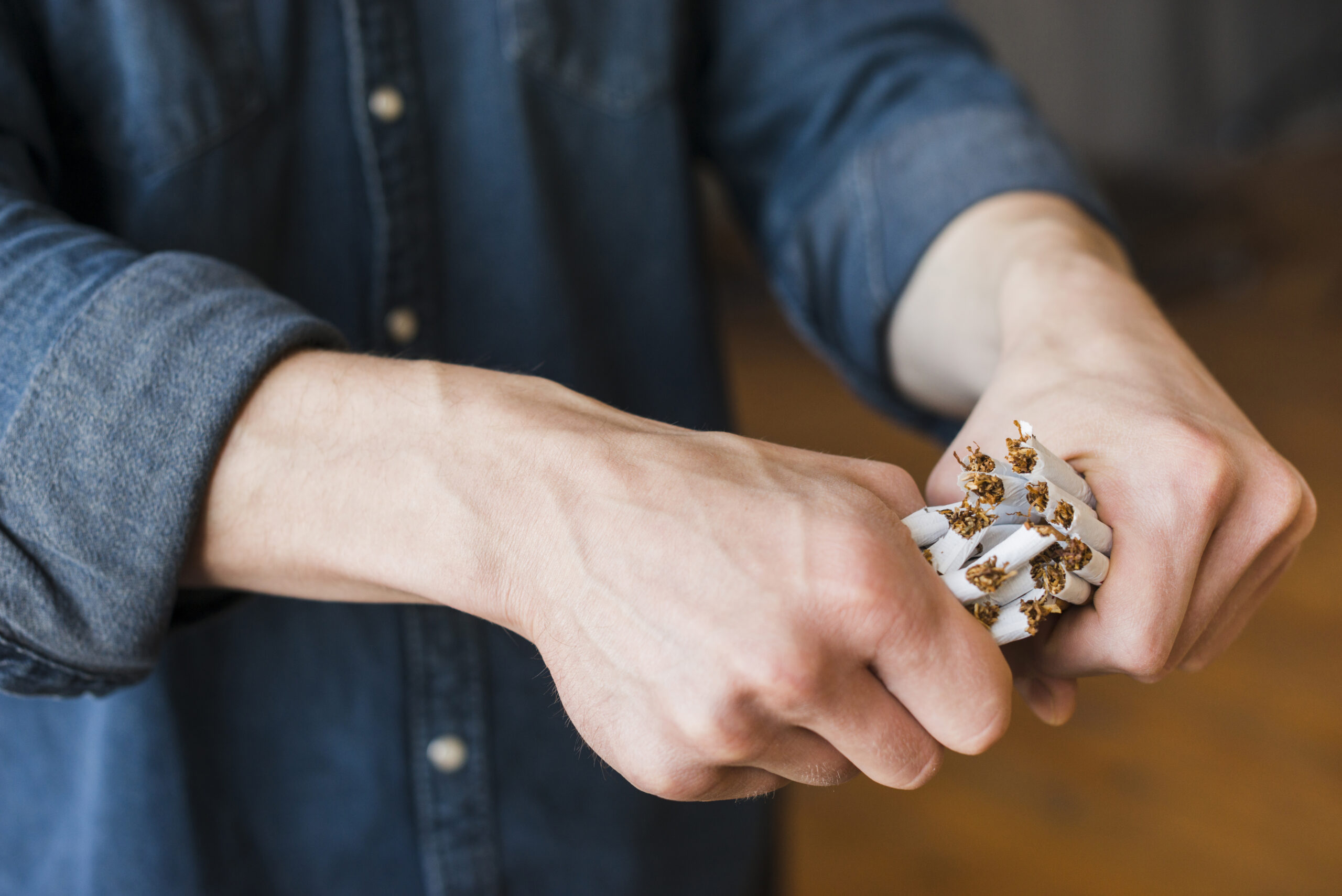It's important to understand that quitting smoking isn't something that happens overnight, especially when withdrawal symptoms kick in. The longer you've been smoking, the more challenging it is to kick the habit – withdrawal symptoms can make you want to give up on breaking free from nicotine addiction. Cleansing the body after quitting smoking often has painful effects. Patients primarily feel nicotine cravings – the symptoms include:
It happens because the nicotine receptors are not satisfied. Although quitting smoking is so demanding, the side effects of freeing yourself from the addiction should not be a barrier – the most violent, negative symptoms after quitting smoking disappear very quickly – after just a few days.
Meanwhile, the long-term effects of smoking can be very negative for health. So, instead of asking whether it is worth quitting smoking, you should think about how to do it in the least inconvenient way for yourself.
The way your body reacts to quitting smoking varies from person to person. Some people handle the process better, while others have a tougher time – a lot depends on whether they're using anti-smoking treatments or going cold turkey. Each day, the symptoms should gradually fade and become more manageable.

Tobacco smoke![]() contains about 4,000 chemicals, including about 40 carcinogens. Here are some of them:
contains about 4,000 chemicals, including about 40 carcinogens. Here are some of them:
The components of inhaled tobacco smoke enter the bloodstream and reach the body's organs, tissues, and cells, causing their damage and disrupting life processes.
There are three groups of factors that influence the development of addiction![]() .
.
The first group of factors concerns the chemical properties of tobacco. Of the components of tobacco smoke that have already been mentioned, nicotine has addictive potential. The pharmacological mechanism of its action is analogous to that of heroin and a*********e; what's more, nicotine![]() has a several times stronger effect on the nervous system than alcohol, opiates, and other drugs. The creation of an “artificial physiological need” – the compulsion to use tobacco – results from an increase in the activity of enzymes that metabolize nicotine and from the so-called neuroadaptation consisting of changing the number of receptors for the substance to maintain a relative balance in the functioning of the body.
has a several times stronger effect on the nervous system than alcohol, opiates, and other drugs. The creation of an “artificial physiological need” – the compulsion to use tobacco – results from an increase in the activity of enzymes that metabolize nicotine and from the so-called neuroadaptation consisting of changing the number of receptors for the substance to maintain a relative balance in the functioning of the body.
The neural basis of tobacco addiction is the activation of the neuronal “pleasure network” by increasing the secretion of dopamine![]() . This mechanism is related to mental functions, and its occurrence can be interpreted as a reward. On the other hand, limiting or lacking nicotine leads to the occurrence of unpleasant withdrawal symptoms, including irritability, anxiety, sleep problems, increased sweating, and problems with concentration.
. This mechanism is related to mental functions, and its occurrence can be interpreted as a reward. On the other hand, limiting or lacking nicotine leads to the occurrence of unpleasant withdrawal symptoms, including irritability, anxiety, sleep problems, increased sweating, and problems with concentration.
The second group of factors conditioning the development and development of tobacco addiction is related to social influences![]() —adults treating smoking as an element of lifestyle model behavior in young people. People who start smoking at a young age become addicted over time. Tobacco is one of those substances that are easily accessible, also in homes and for minors.
—adults treating smoking as an element of lifestyle model behavior in young people. People who start smoking at a young age become addicted over time. Tobacco is one of those substances that are easily accessible, also in homes and for minors.
A huge influence on experimenting with tobacco smoking and its regular smoking among young people is the peer group, in which reaching for this stimulant is the norm. Family and, more broadly, social consent is also important. People who declare that they are against smoking often do not react, even when they see, for example, a child with a cigarette. It is commonly believed that of all addictions, smoking is the least harmful. The data presented here confirms the inaccuracy of this view.
The third group of factors influencing the development and development of addiction focuses on the individual![]() biological and psychological predispositions of a person. The age at which tobacco smoking begins is important. The younger a person is, the faster they become addicted; they smoke longer during their life, and the consequences of smoking cigarettes are more significant for their health.
biological and psychological predispositions of a person. The age at which tobacco smoking begins is important. The younger a person is, the faster they become addicted; they smoke longer during their life, and the consequences of smoking cigarettes are more significant for their health.
Certain personality traits are associated with the risk of developing addiction; these include emotional immaturity, low tolerance for frustration, limited self-control, and impulsiveness and aggressiveness. The risk is also increased by temperamental factors, especially emotional hyperactivity and difficulties controlling emotional states and behavior.
Start to quit smoking![]() by tidying up your home. When you smoke your “last” farewell cigarette, throw all lighters and ashtrays in the trash. It’s also time to wash all curtains, bedspreads, and tablecloths in scented liquid. Also, make sure to clean the carpet and upholstery. Also, use air fresheners to eliminate the smell of tobacco from your home. Such actions will ensure that nothing will remind you of cigarettes.
by tidying up your home. When you smoke your “last” farewell cigarette, throw all lighters and ashtrays in the trash. It’s also time to wash all curtains, bedspreads, and tablecloths in scented liquid. Also, make sure to clean the carpet and upholstery. Also, use air fresheners to eliminate the smell of tobacco from your home. Such actions will ensure that nothing will remind you of cigarettes.
Find your motivation by focusing on the benefits of quitting smoking. Imagine yourself in 10 years without the problem of addiction. Create a list of benefits, starting with those that will appear today.
Divide the benefits into categories and areas where not smoking will significantly benefit you. Keep this list for those moments when your motivation is waning.

Analyze your smoking habits. Think about which cigarettes during the day will be the hardest for you to give up. Plan and write down strategies for these moments. Use your experiences from previous quit attempts to do this. If you don't have them, from other experiences, such as losing weight, giving up alcohol, or other lifestyle changes.
Also, analyze your beliefs and fears. If you have a whole “bag” of beliefs about why you need to smoke, stop for a moment and think about each one. Mark on a scale from 1 to 5 how much it stops you from making a decision and, on the same scale, how true it is. Try to deal with them. If you are unsure about something, ask your loved ones or a specialist for help.
Tobacco addiction is a disease. As with any disease, you can also use medications that will increase your chance of successfully quitting smoking by up to four times. So, how can you use the achievements of medicine to help yourself quit smoking? In any pharmacy, you can buy nicotine replacement therapy![]() without a prescription, i.e., therapeutic nicotine in gum, tablets, patches, or spray. Taking therapeutic nicotine reduces the intensity of withdrawal symptoms, which usually makes quitting the addiction significantly more difficult.
without a prescription, i.e., therapeutic nicotine in gum, tablets, patches, or spray. Taking therapeutic nicotine reduces the intensity of withdrawal symptoms, which usually makes quitting the addiction significantly more difficult.
These symptoms are:
Unfortunately, addiction also involves the emotional sphere (we smoke under the influence of various emotions) and the social sphere (we smoke in specific situations and with specific people), which is why medication alone is often not enough. In the case of addiction, there are no “miracle pills” that will make us quit smoking. Motivation and willingness to make the effort are always needed.
Quitting smoking is a big challenge. Appreciate yourself for it and reward yourself. For example, you can put the money you don’t spend on cigarettes into a separate sub-account. After half a year, you can save a lot of money. Then, think about what will give you the greatest pleasure and reward yourself regularly for your perseverance.
Quitting smoking is a process, and relapses are part of it. However, don’t let individual slip-ups become a relapse. The most important thing is to stick with the process and not give up.
There are many preparations![]() available on the market – the most popular of them are smoking cessation patches, nicotine gums, and smoking cessation tablets.
available on the market – the most popular of them are smoking cessation patches, nicotine gums, and smoking cessation tablets.
Preparations that help you quit smoking are available both over the counter and by prescription. The latter are prescribed by a doctor specializing in addiction treatment. A family doctor, pulmonologist, and psychiatrist often suggest starting treatment. There are various preparations with different mechanisms of action.
This group includes all the preparations described above that are part of the NRT group (patches, gums, candies). There are also medications containing cytisine. Cytisine is an alkaloid of plant origin (it comes from the seeds of the common laburnum), which binds to the same receptors in the brain as nicotine. During therapy, there is, therefore, no need to supply the body with nicotine, which is the cause of addiction.
Behavioral therapy![]() is one of the most effective approaches to helping people quit smoking. The main goal of behavioral therapy is to identify and change harmful thought patterns and behaviors related to smoking. Therapists help addicts identify their motivations to quit smoking, including analyzing the health, financial, and social benefits.
is one of the most effective approaches to helping people quit smoking. The main goal of behavioral therapy is to identify and change harmful thought patterns and behaviors related to smoking. Therapists help addicts identify their motivations to quit smoking, including analyzing the health, financial, and social benefits.
Behavioral therapy also helps to identify situations or stressors that trigger a cigarette and develop strategies to deal with them without resorting to smoking. This may include learning relaxation techniques, meditation, or coping with emotions. Monitoring progress during behavioral therapy is essential, as it allows for tailoring treatment strategies to the individual needs and situation of the patient.
Behavioral therapy can be used alone or in conjunction with other forms of therapy, such as pharmacological therapy (using medications to help stop smoking). Working with an experienced therapist can significantly increase the chances of successfully quitting smoking and maintaining abstinence.

Because quitting smoking is a challenging and demanding process, many people addicted to nicotine turn to unconventional methods such as resonance, acupuncture, or hypnosis.
Nicotine is an intense poison that is addictive both mentally and physically. Of the 4,000 chemicals found in cigarettes, about 40 of them are carcinogenic compounds, consisting of heavy metals and highly toxic substances. Unfortunately, many people are not convinced by this.
The symptoms![]() after you quit smoking can be bothersome for a while. Fortunately, this period will not be too long, but the benefits of quitting
after you quit smoking can be bothersome for a while. Fortunately, this period will not be too long, but the benefits of quitting![]() the habit are long-term and worth the effort.
the habit are long-term and worth the effort.
It all depends on:
People who have been smoking for a long time have a harder time breaking free from the addiction. Suppose you give up cigarettes because external circumstances have forced you to do so. In that case, the symptoms (mainly psychological) may intensify due to the feeling of making decisions under duress, especially when you are constantly tempted. It is where behavioral addiction comes into play or a certain ritual: you smoke because others smoke, you smoke with coffee, or you are in states of tension because you believe that it helps to relieve them. Physical symptoms may pass sooner in people with an efficient metabolism – their body will cleanse itself of toxins faster.
In general, the body copes very well with removing the effects of smoking on its own. Its regeneration after you quit smoking is also a process that you can accelerate or support. Especially if you have problems with the main organs responsible for eliminating toxins from the body or, until now, you have not cared about your diet and physical activity.
Almost all cells produce detoxifying enzymes, which protect tissues and organs from harmful toxins. To effectively remove toxins, almost every organ in the body must work together to produce and use a combination of enzymes and detoxifying compounds. While the entire body works hard to eliminate harmful toxins, a few detoxifying organs do a real job of cleansing.
When cleansing your lungs and body, it’s important to eat a proper diet, do physical and breathing exercises, walk in the fresh air, inhale, bathe, and avoid second-hand smoke. Your body will start the cleansing process on its own. Taking time to rest is just as important as getting some daily exercise.